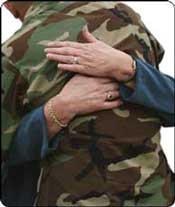
Challenges
 Community providers and their local communities face
significant challenges. “Today, only about 30
to 40 percent of veterans who are eligible
for care actually seek care from VA,” Ms. Power
says. Community providers and their local communities face
significant challenges. “Today, only about 30
to 40 percent of veterans who are eligible
for care actually seek care from VA,” Ms. Power
says.
Mr. Moreno, for example, resisted getting help because,
as a paratrooper trained to be tough and strong, he “didn’t
want to look weak,” he says. Sgt. Nist notes
that a roundtrip from Somerset for an appointment at
the nearest VA facility “takes
the whole day.”
In addition, troubling issues related to trauma can
arise years, even a decade or more,
after the event. Service-related health
care benefits for National Guard and Reserve members,
however, currently last only 2 years.
Family members
affected either by deployments or by
issues related to returning veterans also may require
mental health or substance abuse care in their communities.
SAMHSA Activities
The Agency’s support for the missions of DoD
and VA has produced several significant results, including
the following:
- Suicide Prevention Lifeline—1-800-273-TALK. In July, SAMHSA’s
collaboration with VA culminated in a new service
to help veterans and their families
deal with a potential suicidal crisis.
According to a recent report from SAMHSA’s
National Survey on Drug Use and Health,
male veterans in the general population are at an
elevated risk of suicide.
In cooperation with VA, SAMHSA modified its toll-free
National Suicide Prevention Lifeline. The Lifeline
number, 1-800-273-TALK, automatically
connects callers to crisis centers in
their area. Starting in summer 2007, a new prompt offers
the option of pressing #1 and connecting directly to
a special VA suicide crisis line, located in Canandaigua,
NY, and staffed by mental health professionals.
- Web
Page. A special Web page for veterans
and their families is posted on the
SAMHSA Web site at www.samhsa.gov/vets. (See “Resources
for Veterans”.)
- Mental Health Task Force. SAMHSA’s collaboration
with DoD has included participation in the DoD Mental
Health Task Force, which was “charged with
looking at the efficacy of behavioral health services
for active duty members returning from Iraq and Afghanistan,” says
Ms. Power, who served as SAMHSA’s representative
on the Task Force.
In June 2007, the group’s recommendations went
to the Secretary of Defense, who responded in September
of that year with a “blueprint for action.” DoD
asked SAMHSA to analyze resources, programs,
and initiatives and identify those that can aid in
meeting the recommendations of the Task Force.
The result? A recently completed “Crosswalk” document
highlights several areas where SAMHSA’s expertise
can help. An example, Ms. Power suggests,
may be SAMHSA’s national public service
campaign seeking to end the discrimination
and resulting isolation that affect
persons experiencing mental health and substance abuse
issues—an
effort that DoD “wants to begin to address broadly.”
- National Forum. In May 2007,
a national forum brought together providers of
community mental health and substance abuse services
and representatives of veterans' service
organizations. They provided recommendations to
SAMHSA on how the mental health and substance abuse
provider communities can support DoD and VA efforts
in addressing the behavioral health needs of returning
veterans and their families.
Mr. Moreno, Sgt. Nist, and his wife, Lori Nist, who
serves as secretary of the Somerset County Military
Family Support Group, all attended.
Back to Top
National Conference
Planning is under way for a second national conference
to be held in Washington, DC, during
summer 2008. That conference will build on the lessons
learned from “The Road Home” conference
SAMHSA sponsored in 2006 and will provide
opportunities for collaborative strategic
planning to address the needs of returning veterans
and their families (see SAMHSA
News online, May/June
2006).
Along with SAMHSA, VA, and DoD, organizations representing
two of SAMHSA’s major professional constituencies—the
National Association of State Alcohol
and Drug Abuse Directors and the National Association
of State Mental Health Program Directors—are
participating in planning discussions.
The gathering will emphasize information
sharing and coordination among a variety
of providers and service systems at the Federal,
state, and local levels.
“Improving mental health and substance abuse
treatment services for veterans is SAMHSA’s goal.
We can help bring people together from
the Federal, state, and local levels to make sure veterans
are served with the same dedication
and commitment they showed as members
of our armed forces,” says
Dr. Cline.
For more information, visit SAMHSA’s Web site
at www.samhsa.gov/vets. 
« See Part 1: Veterans &
Their Families: A SAMHSA Priority
See
Also—Veterans &
Their Families: A SAMHSA Priority
Resources for Veterans »
Statistics:
Short Report »
Administrator's Message »
Next Article »
Back to Top |